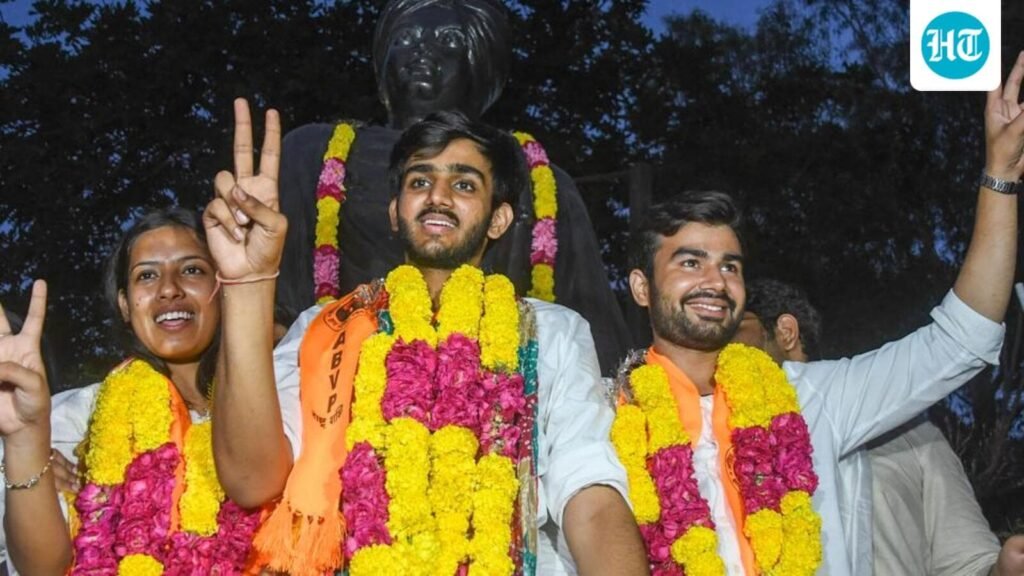The RSS-affiliated Akhil Bharatiya Vidyarthi Parishad (ABVP) stormed back to power in the Delhi University Students’ Union (DUSU) elections, winning three of the four central panel posts, including that of president, as results were declared on Friday.
The Congress-backed National Students’ Union of India (NSUI) managed to secure only the vice-president’s post, while the SFI-AISA alliance yet again failed to open its account.
The results, declared a day after Thursday voting, reaffirmed ABVP’s dominance on campus politics in the Capital.
Aryan Maan of ABVP clinched the president’s post with 28,841 votes, defeating NSUI’s Joslyn Nandita Choudhary by over 16,000 votes, in what may be one of the largest margins in DUSU’s history. SFI-AISA candidate Anjali trailed far behind with 5,385 votes, while 3,175 students opted for NOTA. ABVP leaders hailed the win as the second-highest margin ever in the presidential race, after Akshit Dahiya’s 2019 victory.
NSUI, which staged a dramatic comeback in the 2024 DUSU election securing two posts, scored a single win – with the vice-president’s post going to Rahul Jhansla, who polled 29,339 votes to defeat ABVP’s Govind Tanwar by nearly 9,000 votes.
But the ABVP swept the other key positions. ABVP’s Kunal Chaudhary won the secretary’s post with 23,779 votes against NSUI’s Kabir, while Deepika Jha defeated NSUI’s Lavkush Bhadana to secure the joint secretary’s post by a margin of 4,445 votes.
According to the DUSU election committee, more than 59,000 votes were cast for each of the four central posts.
Over the past decade, ABVP has dominated the president’s chair, winning six times, while NSUI broke through only twice – first in 2017-18, and again last year with Ronak Khatri winning the president’s post. Elections were suspended for two years during the Covid-19 pandemic.
‘Students have sent a clear message’
Soon after his victory, newly elected DUSU president Aryan Maan declared that the result reflected the “patriotic consciousness of Gen Z”, which he said holds India’s unity, integrity, and commitment to nation-building paramount”.
“Delhi University students have sent a clear message that they are capable of giving a befitting reply to elements promoting anti-national and anti-India activities. This victory symbolises the students’ resistance against the corrupt system and hollow politics that the NSUI and Congress Party sought to impose on the university campus,” Maan said. He added that ABVP would prioritise promises like metro pass concessions and infrastructure development.
Joint secretary-elect Deepika Jha emphasised ABVP’s continued focus on women’s representation. “For decades, ABVP has not only provided strong representation to female students in the DUSU but has also ensured their victory.” She added that her victory is a result of the organisation’s skillful strategy and the dedication of its workers. “Looking back over the past 10 years, female candidates from ABVP have consistently been elected to DUSU, and this tradition continued this time as well,” she said.
Meanwhile, NSUI’s sole winner, vice-president-elect Rahul Jhansla, wrote on X: “I dedicate this triumph to every student of Delhi University and pledge that I will continue to relentlessly strive for the protection of your interests and rights.”
The results also drew attention from national leaders. Delhi chief minister Rekha Gupta — herself a former DUSU president in 1996 — and Union home minister Amit Shah congratulated the winners on X.
“This victory is not just of an organization, but of every youth who considers patriotism, discipline, service, and struggle as the guiding path of their life. I am proud that I too lived and learned these values as DUSU president. This result shows that the youth of Delhi remain steadfast on the path of knowledge, humility, and unity, a path that ABVP established decades ago,” wrote Gupta.
“Congratulations to the council’s workers on ABVP’s resounding victory in DUSU elections. This victory is a reflection of the unwavering faith of the youth in the ‘nation first’ ideology. This triumph will further accelerate the journey of transforming the council’s student power into national power,” wrote Shah.
The election process this year was notably smoother, especially compared to last year, with minimal defacement and smaller celebratory processions compared to earlier years. Chief election officer Raj Kishore Sharma called the conduct “very smooth and satisfactory.” The DUSU election committee had repeatedly warned against processions after results, in line with Delhi High Court directions, and both ABVP and NSUI largely complied, confining their celebrations to a single street outside the Arts Faculty.
Promises made
The ABVP manifesto had focused on expanding student facilities, including subsidized health insurance, better sports equipment and nutrition, construction of new hostels, and increased research facilities for final-year scholars. NSUI had campaigned on inclusive and affordable education, gender sensitization, menstrual leave, a women’s helpline, and sanitary pad vending machines.
For many students, however, scepticism lingers. “Only time will tell if the promises are delivered. Leaders talk big during elections but rarely follow through. Even last year, after Ronak Khatri’s win, a lot of his actions were more for social media than the ground,” said a second-year sociology student from North Campus.

